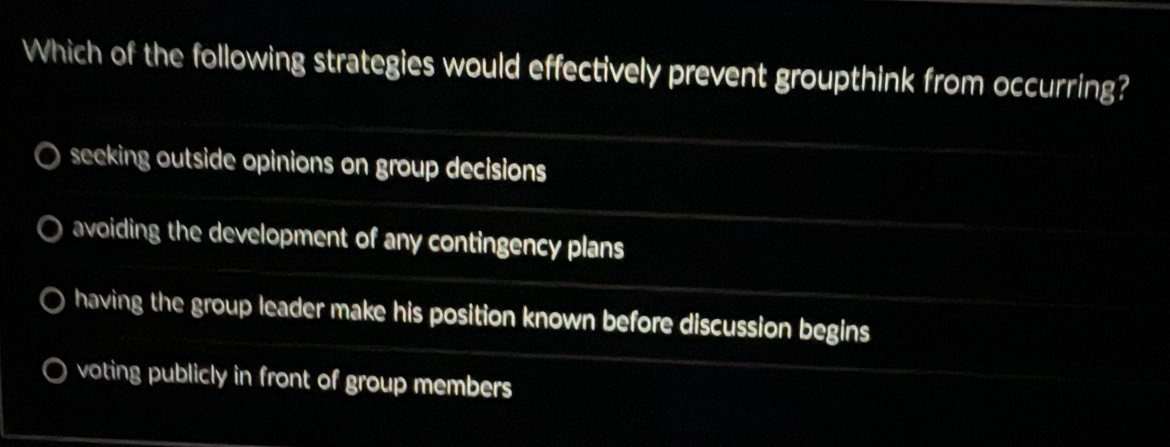To prevent groupthink, encouraging diverse perspectives and fostering open communication are key strategies. By valuing dissenting opinions and promoting critical thinking, teams can avoid the pitfalls of groupthink. Additionally, rotating leadership roles and seeking external input help broaden viewpoints. Which of the following strategies would effectively prevent groupthink from occurring? Let’s delve deeper into effective methods for maintaining objectivity and innovation within group dynamics.
Which of the Following Strategies Would Effectively Prevent Groupthink from Occurring?
Introduction to Groupthink
Groupthink is a phenomenon that occurs when a group of people values harmony and conformity over critical thinking. It can lead to poor decision-making and prevent diverse perspectives from being considered. In order to prevent groupthink, it is important to implement strategies that encourage independent thinking and open communication within the group.
Strategy 1: Encourage Diverse Perspectives
One of the most effective ways to prevent groupthink is by encouraging diverse perspectives within the group. When everyone in the group comes from a similar background or has the same point of view, it can lead to group polarization and the suppression of dissenting opinions. By actively seeking out individuals with different experiences and viewpoints, the group can benefit from a wider range of ideas and opinions.
Implementing Strategy 1:
– Encourage group members to speak up and share their opinions, even if they differ from the majority.
– Seek out individuals with different backgrounds and expertise to join the group.
– Create a culture that values diversity and encourages respectful debate and discussion.
Strategy 2: Foster a Culture of Open Communication
Another important strategy for preventing groupthink is to foster a culture of open communication within the group. When group members feel comfortable expressing their thoughts and ideas without fear of judgment or reprisal, it can help prevent the development of group polarization and encourage critical thinking.
Implementing Strategy 2:
– Establish clear communication norms and guidelines within the group.
– Encourage active listening and respectful dialogue among group members.
– Provide opportunities for anonymous feedback to ensure that all voices are heard.
Strategy 3: Assign a Devil’s Advocate
Assigning a devil’s advocate role within the group can also be an effective strategy for preventing groupthink. The devil’s advocate is responsible for challenging the prevailing opinions and assumptions within the group, which can help stimulate critical thinking and prevent the group from making hasty decisions.
Implementing Strategy 3:
– Rotate the devil’s advocate role among group members to ensure that different perspectives are considered.
– Encourage the devil’s advocate to present counterarguments and alternative viewpoints in a constructive manner.
– Recognize and reward the devil’s advocate for their contributions to the group’s decision-making process.
Strategy 4: Conduct Regular Reality Checks
To prevent groupthink, it is important to conduct regular reality checks to ensure that the group’s decisions are based on accurate information and sound reasoning. By challenging assumptions and verifying facts, the group can avoid falling into the trap of group polarization and reinforce the importance of critical thinking.
Implementing Strategy 4:
– Encourage group members to question assumptions and seek out evidence to support their arguments.
– Consult with external experts or stakeholders to provide independent perspectives on the group’s decisions.
– Review past decisions and outcomes to identify any patterns of groupthink and learn from past mistakes.
In conclusion, preventing groupthink requires a proactive approach that values diversity, open communication, critical thinking, and regular reality checks. By implementing strategies such as encouraging diverse perspectives, fostering a culture of open communication, assigning a devil’s advocate, and conducting regular reality checks, groups can avoid the pitfalls of groupthink and make more informed decisions. Remember, it is essential to embrace different viewpoints and promote a culture where every voice is heard and valued to prevent groupthink from occurring.
Social Work Study Group: Group Therapy with Dr. Pam
Frequently Asked Questions
What are some strategies to prevent groupthink?
One effective strategy to prevent groupthink is to encourage critical thinking and diverse perspectives within the group. By fostering a culture where members feel comfortable challenging ideas and offering different viewpoints, the group can avoid falling into the trap of conformity. Additionally, assigning a devil’s advocate role or seeking external opinions can help mitigate groupthink by introducing new ideas and perspectives.
How can leaders promote healthy decision-making processes to avoid groupthink?
A key way for leaders to prevent groupthink is by establishing clear decision-making procedures and encouraging open communication. Leaders should create an environment where all members feel empowered to express their opinions without fear of reprisal. Setting up checkpoints throughout the decision-making process to review alternatives and assumptions can also help identify any potential biases or risks of groupthink.
Why is seeking feedback from outside experts or stakeholders essential in preventing groupthink?
Obtaining input from external sources such as experts or stakeholders is crucial in preventing groupthink because it introduces fresh perspectives and challenges the group’s assumptions. External feedback can provide valuable insights that may not have been considered within the group, helping to avoid the tendency to agree without thorough evaluation of alternative options. By soliciting diverse opinions, the group can make more informed decisions and reduce the likelihood of groupthink.
Final Thoughts
In conclusion, to effectively prevent groupthink, diverse perspectives must be encouraged within the group. Promoting open communication and constructive debate can help challenge the status quo and avoid biased decision-making. Implementing strategies such as assigning a devil’s advocate or seeking outside opinions can also bring fresh insights and prevent groupthink from occurring. It is crucial for organizations to prioritize these strategies to foster a culture of critical thinking and avoid the pitfalls of groupthink. Which of the following strategies would effectively prevent groupthink from occurring?




